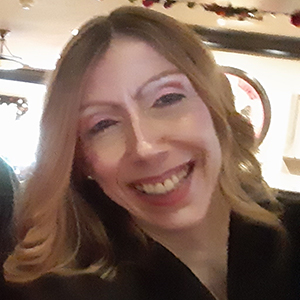Zoë Chouliara

Zoë is an award winning clinical academic. She has 14 years of clinical experience and 10 years of clinical supervisory experience in working with severe and/or complex presentations across sectors, including the NHS, voluntary and independent sector. She has delivered talks and clinical workshops nationally and internationally.
Zoë is currently in independent practice and in addition to her own practice, she offers clinical services as a Senior Consulting Psychologist at YourGP Edinburgh and in the Purple House Clinic Glasgow. She is also currently based on the NHS as a locum Consultant Psychologist locum in the Post COVID Syndrome Psychology Service, Ulster Hospital. Zoë has been a leader in her field and as a Professor has led various groups to success in academia and in professional training counselling courses, as a strategic leader.
She has delivered training and clinical workshops nationally and internationally in conferences and in prestigious HEIs. She is well published, loved by the public who have attended her professorial lecture and symposia by hundreds, and also loved by the media with many interviews and pieces on key topics. Her videos are available to watch on YouTube and Vimeo.
Her clinical and research expertise is on the following areas:
- Severe and / or Complex Appearance Distress / Plastic Surgery & Dermatology
- Recovering from Severe Adversity/Childhood Abuse and Sense of Self & Identity.
She is highly experienced and has skills in psychological assessment in general adult mental health but most importantly in assessments for plastic surgery. Zoë is a research leader with a portfolio of publications and impactful funded research in recovering from childhood abuse/complex trauma and dermatological conditions/appearance distress.
She is the lead author of the Acts of Recovery, the first research-based, survivor-centred self-help resource for survivors of childhood abuse (Named in the Top 100 Nation’s Lifesavers List, May 2019). She has been awarded the BJN Dermatology Award 2016, as part of the team of expert trainers delivering the first ever Dermatology Masterclass nationally and internationally.
She has successfully led a specialist psychology in plastics service in NHS Tayside for three years, one out of only four similar services in the country.
She was a volunteer clinician with the Medical Foundation (now Freedom from Torture), where she practised clinically with survivors of torture/organised violence.
She is one out of a few practitioner psychologists in the UK and internationally with clinical experience in the field of human rights and organised violence.
She is Past Chair of the British Psychological Society (BPS), ex Assistant Chief Supervisor for Health Psychology, Associate Fellow of the BPS and Fellow of the Higher Education Academy.
She is the first practitioner psychologist to sit in the Cross Party Group on Skin & Associated Rheumatic Conditions.
Presentation at The Society of Tissue Viability 2022 Conference
Psychological factors in would healing and how they could be addressed in clinical practice: ‘Wound is where the light enters’
Objectives
After attending this session, persons will be able to:
- Develop a deeper and more multidimensional understanding of psychological factors in wounding healing & of the psychological barriers in self wound care
- Learn strategies on how to address these in practice
- Exchange experiences as colleagues and learn from each other within a safe and growth – focused environment
Abstract
The body-mind links have long been explored, as psychoneuroimmunology has been advancing over the last 20 years. Such links can have a direct effect on wound healing. The psychological impact for patients with wounds is significant and can be direct and indirect.
Adverse psychological effects frequently occur when there are permanent changes in the body’s structure or function. Evidence suggests that anxiety, depression, and stress can adversely impact on the wound healing process per se and on self- care. In addition, the psychological toll of living with a wound, especially so a chronic one, can also impact on quality of life, social life, body esteem and self-worth.
On the other hand, psychological factors can indirectly impact on wound healing, via health behaviours and self-care practices and adherence. Many patients face challenges in caring for wounds and adhering to medical advice, which adversely impact on wound healing and their wellbeing.
Wounds constitute a physical trauma, which triggers complex immunological processes. These include activation of inflammatory processes, and the body’s defence and healing mechanisms. Such processes can be reflected psychologically and experienced as psychological trauma. A wound confronts us with our vulnerability. Essentially a wound can be a call for self- reorganisation and growth, as much as it is a source of distress and discomfort. We are called to nurse the wound, make meaning, heal, and move on.
In this presentation we will be looking at clinical examples of how we can work with patients with wounds to help them self-care, encourage health behaviours that maximise healing, and even facilitate growth psychologically. We will refer to clinical case studies and examples for the presenter’s clinical practice over 14 years in clinical health, dermatology, plastics and general adult mental health.
We will discuss various psychological ‘red flags’ which could help identify patients who might struggle more with wound self-care and complicated healing. We will discuss psychological challenges, which may interfere with wound healing and self -care, and identify strategies on how to help manage these challenges.
Email: zoe.choulara@outlook.com
Tel: 07742728169














